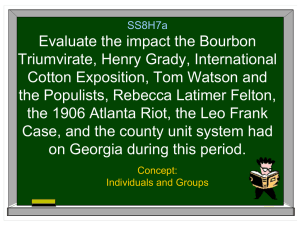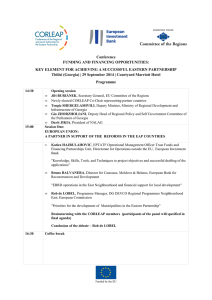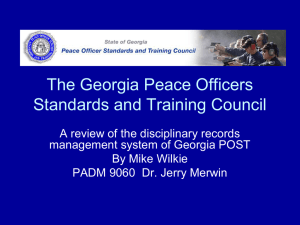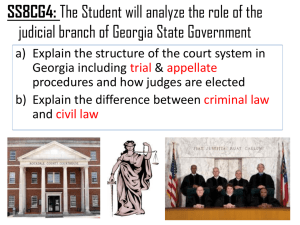View Event Presentation
advertisement
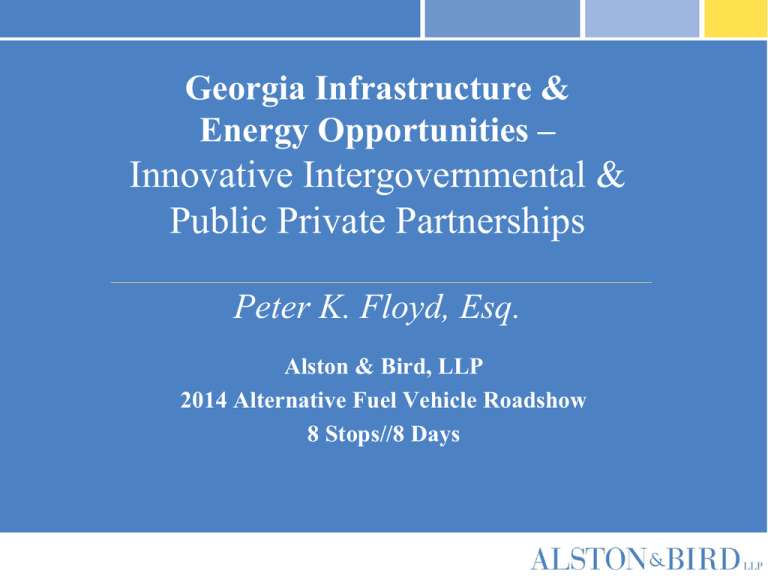
Georgia Infrastructure & Energy Opportunities – Innovative Intergovernmental & Public Private Partnerships Peter K. Floyd, Esq. Alston & Bird, LLP 2014 Alternative Fuel Vehicle Roadshow 8 Stops//8 Days Alston & Bird LLP 2 Atlanta Headquarters with 800+ attorneys Attorneys ranked among the best in the U.S. and the world Strong practices in energy and infrastructure development Public and private finance International construction & government contracts practice Tax Expertise (Intl., Fed., State & Local) Represent: Ga. state and local governments, public and private businesses, engineering and design firms, contractors and subcontractors. Extensive Experience with: public finance, commercial construction, tax, grants and incentives, , water and sewerage, solid waste, energy, hospital-medical office building projects, college and university projects, retail and hospitality projects, sporting venues, industrial plants and facilities. Peter K. Floyd A&B is counsel to Electric Cities of Georgia, including Location Georgia, its nonprofit economic and community development service, MEAG Power, the Municipal Gas Authority of Georgia and a number of other local governments (general/electric/gas/water/sewerage/telecom/waste) and related entities Also, represents private entities seeking incentives, in public private partnerships and utility customers (e.g., customers of Georgia Power or EMCs) along with traditional and renewable independent power providers (IPP) in Georgia and nationally My areas of expertize: Complex Intergovernmental and Public Private Relationships; Government and Economic Incentives; Energy and Utilities (transactions and regulatory (Ga. PSC)); Infrastructure; and Public Finance Disclaimer – Nothing herein should be interpreted as the formal position of A&B or any of its clients 3 Disclaimer – Very high level summary and not intended as legal advice re: a particular project Table of Contents 4 Focus Energy & Sustainability Related Development Overview of Georgia Public/PPP Finance and Development Structures Traditional with a Twist Energy and Operational Cost Savings (ESPC and other) Joint Intergov. Infrastructure Development, Funding and Operation Infrastructure as a Service (Outsourcing) On-Bill Financing and PACE Get to the Point - Whether AFVs or a fueling/charging station is right for you is simply one part of an overall operational cost savings and sustainability strategy as a business or local government. - All traditional financing options (plus a few more) are available to Georgia local governments. - There are more economic and efficient financing, savings and technology opportunities available for larger projects. - Multiple local governments should consider working together and with local business regionally to define a cohesive plan and take advantage of economies of scale. 5 Focus Energy & Sustainability Related Development 6 Why are my clients interested? • Sustainability/Stewardship My definition: “The efficient use of limited resources.” “Stewardship is an ethic that embodies the responsible planning and management of resources. The concepts of stewardship can be applied to the environment, economics, health, property, information, theology, etc.” 7 Why are my clients interested? Low costs of energy in US is a driver for reshoring of manufacturing 8 Why are my clients interested? Low costs of energy in US is a driver for reshoring of manufacturing 9 AKA: the “Frack You” Europe and Japan Chart… Source: http://ourfiniteworld.com/2012/03/23/why-us-natural-gas-prices-are-so-low-are-changes-needed; World Bank Commodity Price Data (pink sheet) Why are my clients interested? Dealing with environmental regulation “EPA orders power plants to cut carbon emissions” June 2, 2014, Dave Williams - Staff Writer- Atlanta Business Chronicle “The Environmental Protection Agency Monday proposed the first-ever limits on carbon emissions by existing power plants, the single largest source of carbon pollution in the nation. In giving utilities until 2030 to cut carbon emissions 30 percent below 2005 levels, EPA Administrator Gina McCarthy said the U.S. can fight climate change and supply Americans with reliable and affordable power at the same time.” 10 Why are my clients interested? Consequences of Non-Attainment A non-attainment designation under the Clean Air Act carries serious repercussions including the loss of federal highway funding and the loss of economic development opportunities. Loss of Federal Highway and Transit Funding One year from the date of a non-attainment designation, federally funded highway and transit projects will not be allowed to proceed unless the state demonstrates there will be no increase in emissions associated with the projects. Boutique Fuels Non-attainment areas are subjected to the Clean Air Act's reformulated gasoline program, which significantly raises the price of motor vehicle fuels for consumers. Enhanced Regulatory Oversight Once an area is designated as being in non-attainment, EPA has the authority to intervene and revise permitting decisions throughout the state. Source: U.S. Chamber of Commerce, http://www.uschamber.com/issues/environment/consequences-non-attainment 11 Why are my clients interested? Restrictive Permitting Requirements New and upgraded facilities in, or near, non-attainment areas are required to install the most effective emissions reduction controls without consideration of cost. Operators of existing facilities may also be required to install more restrictive control technologies than are otherwise required for similar units in areas that are in attainment. Mandatory Emissions Offsetting Prior to permitting the construction of new facilities, a state must offset any emissions increases by achieving reductions at existing facilities. Loss of Economic Development Opportunities The added regulatory and paperwork burdens, as well as expenses associated with constructing new facilities, or expanding existing ones, limit the amount of economic investment in non-attainment communities. Source: U.S. Chamber of Commerce, http://www.uschamber.com/issues/environment/consequences-non-attainment 12 Why are my clients interested? Metro Atlanta Chamber's Clean Tech Leadership Council Goal: “to bring 6,000 “clean tech” jobs to Atlanta by 2017” “The council will concentrate on seven verticals: smart grids, alternatively-fueled vehicles, solar power, water, green building and sustainability services, biofuels and batteries, and recycled products. Clean tech is an umbrella term used to describe innovative green jobs across several different industries. Clean tech jobs include ocean-based energy production, solar-panel manufacturing, and biofuel research. "Cleantech is a large market, it's a growing market, it’s a market that has high wages, and it's a market in which Atlanta starts from a very significant position of strength," said John Brock, chairman of the Metro Atlanta Chamber. According to The Brookings Institution’s Sizing the Clean Economy’s 2011 study, Metro Atlanta is already a leader in the clean tech industry, with more than 43,000 people working in related jobs.” Source: http://www.strategic-imperatives.com/NewsRoom/4-18-12 13 Why are my clients interested? $1.2 Trillion in Potential Savings From Energy Efficiency By KATE GALBRAITH, The New York Times (July 29, 2009) “A new report on energy efficiency from the consulting firm McKinsey found that the United States could save $1.2 trillion through 2020, by investing $520 billion in improvements like sealing leaky building ducts and replacing inefficient household appliances with new, energysaving models.” 14 Overview of Georgia Public/PPP Finance and Development Structures 15 Traditional Structures There’s no reason that local government’s traditional financing options can’t be used for efficiency/operational savings projects. Traditional “non-appropriations” lease financing, e.g., GMA or ACCG COPs programs. See O.C.G.A. § 36-60-13. Many building improvements and equipment/vehicle purchases are made this way. The equipment/vehicle provider is willing to be the lender for these transactions in many cases. Be wary of the “guaranteed” part of ESPCs, which are optional, complex and in many cases unnecessary, i.e., a waste of money. The details of the verification process are the key. Revenue bonds under the “Revenue Bond Law” (O.C.G.A. § 36-82-60) or other applicable law. Available if there is a revenue component to your transaction, e.g., CNG or EV filling/charging station that is made available to the public or a limited number of private entities. Back door general obligation (GO) revenue bonds through an intergovernmental contract or intergovernmental contracts There are two versions of this: 16 A true revenue deal like the revenue bonds described above except another local government is a customer (note: Ga. intergovernmental contracts are GO obligations unless expressly not). See the Intergovernmental Contracts Clause of the Ga. Const. Traditional Structures (cont.) Back door general obligation (GO) revenue bonds through an intergovernmental contract or intergovernmental contracts The second version merely uses a conduit issuer like a development authority or other authority to create a GO obligation from the true party getting the benefit of the project, e.g., the recent school district solar project in Dublin through the Dublin-Laurens Development Authority. This structure bypasses the referendum requirement for standard GO bonds. Traditional GO Bonds (hell or high water, full tax base pledged bonds). The project could be the only thing financed, but more typically would be part of many projects to get the largest aggregate lending amount, which attracts more lenders/bond purchasers. Special Option Sales Tax (SPLOST) Bonds. Simply bonds sold with sales tax pledged in lieu of other credit. Consider TADs (given the recent Ga. Supreme Court ruling) and CIDs See Sherman V. Atlanta Independent School System et al., Ga S. Crt S13A0333 (June 3, 2013); “Georgia Supreme Court OKs Perry-Bolton bonds” Atl. Business Chronicle (Jun 17, 2013)(http://www.bizjournals.com/atlanta/news/2013/06/17/georgiasupreme-court-oks-perry-bolton.html). Also look to combine with grants and for opportunity to share the benefits of Federal, State and Local tax and other incentives with private partners In other words, know what incentives the private side of your projects are benefiting from and extract what economic benefit you can. Also, look for private incentives that a local government can’t take advantage of, but can be assigned to private partners. 17 Dublin High School Project Medium Scale Example: Larger commercial customers or developers (100kW to 1 MW) Education notebook: Dublin schools break ground on solar project “Dublin city school … Solar panels will be installed on the roof and on the grounds of Dublin High School, and they are expected to be up and running by June…” • Size: Approx. 1 MW • Financing: Development Authority Revenue Bonds • Security: 25 year intergovernmental lease • Projected savings $3.5 million over term • Equipment supplier: MAGE Solar, a German company with offices in Dublin • Equipment owner/lessor: Greenavations, a Macon-based alternative energy company • Likely legal structure: • Greenavations – Lessor (possibly lendor/bond purchaser) • Development Authority – Lessee • School District - Sublessee Source: The Macon Telegraph, March 17, 2013, By Staff : http://www.macon.com/2013/03/17/2400414/dublin-schools-break-groundon.html#storylink=cpy 18 Traditional with a Twist 19 Other Examples • Converting vehicle fleets and other equipment that burn gasoline, diesel or propane to compressed natural gas. • Several Cities (I’m aware of approx. 10) are currently in various phases of study respecting projects like this, including Covington, Douglas, Dublin and Thomasville. • Alternative Fuel Vehicle and Clean Energy Roadshow in 7 different Georgia cities is starting later this month. 20 Other Examples • Local governments can also consider participating directly or indirectly in Georgia Power’s Advanced Solar Initiative • E.g., leasing excess property located near GPC facilities to a solar developer for use in the program and generating lease revenue • Traditional local government financing options could be combined with ESCO or other party funding, development or operations • Also, consider DOE and other federal loan guarantee programs, which can be coupled with state and local projects (e.g., MEAG Power and New Vogtle Units) 21 Energy and Operational Cost Savings (ESPC and other) 22 Traditional ESPCs: Typical transaction A typical EPC project is delivered by an Energy Service Company (ESCO) and consists of the following elements: Turnkey Service – The ESCO provides all of the services required to design and implement a comprehensive project at the customer facility, from the initial energy audit through longterm Monitoring and Verification (M&V) of project savings. Comprehensive Measures – The ESCO tailors a comprehensive set of measures to fit the needs of a particular facility, and can include energy efficiency, renewables, distributed generation, water conservation and sustainable materials and operations. Project financing – The ESCO arranges for long-term project financing that is provided by a third-party financing company. Financing is typically in the form of an operating lease or municipal lease. Project Savings Guarantee – The ESCO provides a guarantee that the savings produced by the project will be sufficient to cover the cost of project financing for the life of the project. 23 Sources: Energy and Environmental Project Finance Law and Taxation Law, Energy Saving Performance Contracts (Chapter 11), William Hughes (Alston & Bird, Partner); U.S. EPA ENERGY STAR Buildings Program’s Introduction to Energy Performance Contracting, Prepared by: ICF International National Association of Energy Services Companies (October 2007) ESPC Markets Federal – system built to avoid Federal appropriations process MUSH – muni & state gov., universities, K-12 schools, & hospitals* Commercial and Industrial Utility Residential Programs Public Housing * Ga. Energy Service Coalition is meeting monthly on how to serve MUSH. 24 Role of ESPCs in Green Building “Savings-Paid Green Retrofits” Innovative approach to financing and implementing energy efficiency capital improvements ESCO industry has experienced rapid growth: 25 2000 - $2 billion (total revenue) 2006 - $3.6 billion 2008 - $4.1 billion 2011 - $7.1-7.3 billion (projected) Georgia ESPC Legislation Constitutional prohibition limited multi-year contracts for certain Ga. Governmental Units Guaranteed Energy Savings Performance Contracting Act, O.C.G.A. § 50-37-1, et seq. and related Constitutional Amendment Governmental Units State government agencies Colleges and universities Counties and municipalities* Public school districts* Contract for up to 20 years – solves the one year contract limit applicable to many GA gov. units ESCO guarantees that cost savings or revenue increases will meet or exceed project cost within the financing term * One of many options available for local governments. 26 Georgia ESPC Legislation “Energy conservation measure” means a program, or facility alteration, or technology upgrade* designed to reduce energy, water, waste-water, or other consumption or operating costs. The term may include, without limitation: Insulation, windows, doors, energy control systems, HVAC, lighting, water and sewer. Training program. A program to reduce energy costs through rate adjustments, load shifting to reduce peak demand, or use of alternative suppliers** as otherwise provided by law. Renewable generation systems owned by the governmental unit, such as solar photovoltaic, solar thermal, wind, and other tech.** * “Program, or …Technology upgrade” – we’re not just talking about buildings. ** Must understand and comply with Georgia Territorial Electric Service Act of 1973 and Georgia Cogeneration and Distributed Generation Act of 2001. I have another presentation on these Acts if anyone would like a copy. The ESPC Act requires notice to utility providers of ESPCs . 27 How does that impact me and my clients? The State is going slow and setting a cap on the aggregate amount of ESPC funded improvements by State Agencies. ESCOs are all revved up to go in Georgia and the State’s slow go process has them beating down the door of entities that own lots of facilities: • Cities • Counties • School Boards • Hospitals Walk through the convention vendor area and count the ESCOs and other efficiency service providers. That’s not a bad thing unless you let the ESCO drive. Local governments have many more options than State Agencies or the Federal Government and have access to independent experts. 28 Georgia ESPC Legislation Expressly provides that “The provisions of this chapter shall apply only to contracts entered into by a governmental unit pursuant to the authority granted by this chapter.” Parts of the ESPC Act are different for State Agencies and Local Governments. Examples: RFPs from at least two qualified energy services providers if available public advertising not required to use GEFA prequalified ESCOs Method of getting around certain State Agency multi-year contracting limitations; Local Governments have other options Like Federal ESPCs not really designed for Local Governments 29 Georgia ESPC Legislation State Agencies are subject to GEFA Regs and Review GEFA - tasked with prequalifying Qualified ESCOs GEFA - regs and policies necessary to carry out ESCO Act contracting and procurement procedures for State Agencies GEFA - provide technical assistance to State Agencies GEFA - develop model contractual and related documents for use by State Agencies. State Agencies required to proposed contract or lease to GEFA for review and approval 30 Georgia ESPC Legislation GSFIC is authorized to establish certain financial criteria and policies related to State Agency ESPCs No State Agency ESPCs may be entered into before GEFA and GSFIC regs and policies State Agency ESPCs are expressly subject to appropriation limitations Noncompliant ESPCs are “void and of no effect” 31 Potential Issues: • Guarantee: Tool built for the Feds and State and not your clients – the “guarantee” was the reasoning behind creating the appropriations loophole, but has less utility for others • Guarantee is only as good as the ESCOs credit and the verification process • Guarantee is optional and costs $: why buy it if your client is confident that the technology will achieve the desired result • ESCOs may be partial to their technology and have unnecessary blinders on as to broader or innovative O&M savings opportunities • Local Governments have many more financing options than the Feds, so financing through the ESCO is one of many options • Many ESCOs are relatively new to Georgia and are not familiar with the other local gov options 32 Example City of Albany, Dougherty County and School District – Joint RFP for Energy Savings “Scope of Services Three separate entities; the City of Albany, Dougherty County School System and Dougherty County Government, seek to identify and implement capital improvements to reduce energy and operational costs in addition to and including the information attained from the attached Electric Cities of Georgia audit that was completed in April 2013. The entities seek to identify energy conservation measures (ECMs) and related operational savings in order to pay for facility upgrades and services.” See www.dougherty.k12.ga.us/purchasing/FacRFP/13-058.pdf 33 . Joint Intergov. Infrastructure Development, Funding and Operation 34 Baxter International and the Stanton Springs Industrial Park 35 Life Sciences 1,800 Jobs $1,300,000,000 750,000 sf facility Jasper, Morgan, Newton and Walton Counties 36 37 $14 million Georgia BioScience Training Center in Stanton Springs Industrial Park “Work is starting on the $14 million Georgia BioScience Training Center in Stanton Springs Industrial Park, a perk that accompanied Baxter International’s $1 billion manufacturing campus on the Newton/Walton county line. The state is hosting a groundbreaking for the 48,000 square-foot center at 10 a.m., Monday, and Gov. Nathan Deal will be attending. The center was part of the state’s incentive package to Baxter. A portion of the center will be dedicated to training Baxter employees, but training for other companies will also be offered there. Newton County Chairman Keith Ellis said the facility is in the Newton County portion of Stanton Springs, which also includes part of Walton and Morgan counties. The industrial park is jointly owned by those three counties along with Jasper County.” 38 Sharing in the investment risks and now rewards through the JDA is a great example of intergovernmental relationships used effectively. Infrastructure is also being developed with the share risk/reward model, e.g., Covington, Madison and Social Circles joint funding, development, ownership and operating of the Stanton Springs Gas System. 39 Intergovernmental Coop. GEFA, MEAG Power & Gas Authority South Georgia Governmental Services Authority – region wide effort to jointly finance infrastructure (e.g. fiber network assets) and coordinate O&M Participating in regional and statewide entities and projects helps you look big and sophisticated when you want to (e.g., with prospects and financings) and small and needy when you don’t (grants please and private activity bond allocations by Ga. DCA) and can facilitate investment (risk and revenue) diversification opportunities 40 Infrastructure as a Service (Outsourcing) 41 Electric Cities/GE Smartgrid as a Service (SaaS) Available for multiple utilities (e.g., water, gas and electric) There is a “governmental” vs “nongovernmental/proprietary” distinction in Georgia case law respecting the ability of local governments to contract with private parties for multiple years. Norcross has outsourced the metering of its electric customers for 10 years to Electric Cities/GE Electric Cities/GE owns the meters and various components of the system and delivers metering data and certain system automation on cloud basis to Norcross Norcross still does the “governmental” part, e.g., rate setting GE has effectively “financed” these system improvements for Norcross by owning them and merely charging a service fee 42 On-Bill Financing and PACE 43 Utility On-Bill Financing www.gefa.org • $5,000,000 available as grants. • Eligibility limited to energy utilities. • 100% of funds must be allocated towards one or more of following residential energy-efficiency incentive programs: •On-bill loan •On-bill tariff •Interest rate buy-down • Eligible residential energy efficiency activities: • Whole Home Performance with Energy STAR • Energy STAR appliance upgrades • Home weatherization NOTE: no reason that a program like this couldn’t be used with customer generation as a permitted activity. 44 44 Property Assessed Clean Energy (PACE) Financing (see the Clean Energy Atlanta Program: https://ygrene.us/ga/atlanta) • On-Bill Utility Financing (muni utilities frequently sell or “loan” funds to purchase discount appliances to promote electric or gas use that are secured by utility liens. Efficiency improvements are permitted too. See e.g., the City of Thomasville, Georgia’s Program through Electric Cities of Georgia, Inc. or the Municipal Gas Authority of Georgia program.) • What about AFVs and home charging/fueling stations? * See recent changes to Development Authority and DDA Law (O.C.G.A. § 36-42-3 and 36-62-2) Other Programs/Technology Upgrades • Software – (example work order management) (HiperWeb though ECG; see http://www.ecoga.org/Content/Default/28/68/0/hiperweb/hiperweb.html) 45 Property Assessed Clean Energy (PACE) Bonds Legislation in Georgia and 14 other states Local gov. issues bonds to create loan pool Local gov. makes loans to private building owners for energy-saving or renewable energy retrofits Property taxes or utility bill on retrofitted buildings are increased by amount necessary to repay loan Loans are backed by property-tax or utility lien on retrofitted buildings No increase for nonparticipating residents Owner can couple this with Guaranteed Energy Savings Performance Contracting (ESPCs) 46 Georgia’s Version of PACE House Bill 1388, enacted in 2010, amended legislation related to certain Georgia development authorities to permit bond financing for the installation at residential, commercial, industrial or other qualifying property of: renewable energy systems, energy efficiency or conservation improvements, and water efficiency or conservation improvements. Development authorities do not have the power to tax, but could contract with local governments to collect as part of utility bill (water, sewer, gas or electric) and establish a utility lien on improved property. Notes: The Federal Housing Financing Agency (FHFA) issued a statement in July 2010 concerning the senior lien status associated with most PACE programs. In response to the FHFA statement, most local PACE programs have been suspended until further clarification is provided. Not aware of this statute having been used yet. But, I’m happy to help a local gov. try it out. 47 What Programs in Georgia Already Promote Solar? Clean Energy Atlanta Program What Is It? 48 Clean Energy Atlanta is a program that provides private funding for building energy upgrades at no installation cost, with such financing being repaid through property tax assessments. Clean Energy Atlanta provides 100% financing to commercial property owners for renewable energy and energy efficiency improvements. The capital for improvements is repaid over a long term through property taxes at modest interest rates, making projects affordable. $200 million of energy retrofit funds were released by Invest Atlanta, the economic development authority of Atlanta, for the Clean Energy Atlanta program. Clean Energy Atlanta is sanctioned by the City of Atlanta and administered by Ygrene Energy Fund, a provider of clean energy finance projects. cont’d. Multiplex residential buildings (e.g. apartment blocks, What Properties are Eligible? 49 condos, dorms, and nursing homes of 5+ units) Small commercial buildings (e.g. warehouses, office buildings, retail spaces, hotels, restaurants) Large commercial buildings (e.g. large warehouses, multistory office buildings, convention centers, malls) Industrial properties (e.g. breweries, factories, mills, power plants) Energy & Operation Savings Takeaways • Convergence of available and proven technologies and low interest rates means unique opportunities to develop cost saving plans. • The larger the aggregate value of the deal and the shorter the financing term the easier it will be to finance the project, so consider combining with other improvement or refinancing transactions. • Consider intergovernmental contracts or cooperation to maximize deal size to attract financing and more ESCOs to compete with each other. Other efficiencies include likely having common utility providers for single rate analysis and negotiation/collective bargaining and common conditions, e.g., weather and time of use of facilities. 50 Energy & Operation Savings Takeaways Consider: • County Wide or Region Wide Comprehensive Energy Plans and Community Wide Independent Energy Audits • The Service Delivery Strategy Law as a forum for discussing and funding plans and audits • Available nonprofit, independent energy experts in the state (e.g., GMA, Electric Cities of Georgia, Inc. (ECG) and Municipal Gas Authority of Georgia) • Example ongoing Albany, Dougherty County and School District joint ESCO RFP with the assistance of ECG • Consider your local government utility providers and potential for choice of energy provider 51 Energy & Operation Savings Takeaways Consider: • Flexibility of negotiating governmental rates with local govern utilities, which are not available with IOU (i.e., GPC or natural gas marketers) • Economic development benefits and financial and non-financial incentives, e.g., express permitting or customer service to existing “key customers.” Alternatives to tax abatements should be considered given equipment depreciation cycle. 52 Get to the Point - Whether AFVs or a fueling/charging station is right for you is simply one part of an overall operational cost savings and sustainability strategy as a business or local government. - All traditional financing options (plus a few more) are available to Georgia local governments. - There are more economic and efficient financing, savings and technology opportunities available for larger projects. - Multiple local governments should consider working together and with local business regionally to define a cohesive plan and take advantage of economies of scale. 53 Sharing some ideas 54 PKF – Other Presentations and Events 55 Economic & Community Development – Innovative Intergovernmental & Public Private Partnerships – Ga. City-County Management Assoc. and Ga. Rural Water Assoc. – April 2013 and May 2013 Carl Vinson Institute of Government (CVIOG), Economic Development Professionals Training, February 5, 2014 and December 5, 2013 Convergence of Electric and Natural Gas and its Effect on Smart Grid and Demand-Side Resources-March 17, 2014 Alternative-Fueled Vehicle Roadshow on Transportation and Clean Fuels – Georgia Local Government Financing Options - June 3-21, 2013 Natural Gas Vehicle Fleet & Infrastructure Summit – Utility Perspective- June 6, 2013 Engineering & Operations Exchange - June 13, 2013 2013 City Attorneys § CLE Seminar & Annual Business Meeting – ESCOs - June 23, 2013 Ga. Assoc. of Water Prof. Energy Workshop, Funding Options for Energy Saving and Other Operational Saving Transactions – July 31, 2013 PKF – Other Presentations and Events 56 M&J University, Tax Credits, Incentives and Economic Development – July 11, 2013 Energy Client Advisory - Electric Service Rights to Premises Locating in Wholly New Municipalities or Consolidated/Annexed Areas - September 2013 Solar Programs in Georgia and Proposed Amendments to the Georgia Cogeneration and Distributed Generation Act and Electric Territorial Act - March 18, 2013 Innovative Smart Grid Projects - November 7, 2012 Are you ready to be deposed - Engineering & Operations Exchange - June 11-13, 2012 Finance 101 Forum for Utility Managers - May 2, 2012 Economic Development Advisory: Georgia General Assembly Passes Economic Development-Friendly Bills During 2012 Session - April 10, 2012 Ga. Electric Service 101 – Executive Summary of Ga. Territorial Electric Service Act and Ga. Cogen and Distributed Generation Act - November 11-13, 2011 Update on the Deployment and Use of Smart Grid Technology in Georgia - October 17, 2011 Sustainable Cities - GMA Annual Convention - June 2 -28, 2011 PKF – Other Presentations and Events 57 Legislative Update - Electric Cities Annual Meeting - March 30, 2011 Green Building Focus - February 24, 2011 Georgia's Constitutional Amendment 4: Guaranteed Energy Savings Performance Contracting - February 23, 2011 DOE Loan Guarantees - Real Estate and Renewable Energy Markets Forum - August 24-2 , 2010 Georgia Territorial Electric Service Act 101 - August 27, 2009 Public Finance 101 - 2008 TGA Utility Finance & Accounting Conference (August 1819, 2008) Public Finance Advisory: Certain Governmental Issuer’s Tax-Exempt Bonds Questioned by IRS Regarding Post-Issuance Tax Compliance - January 30, 2009 Solar Programs in Georgia and Proposed Amendments to the Georgia Cogeneration and Distributed Generation Act and Electric Territorial Act - March 18, 2013 Innovative Smart Grid Projects - November 7, 2012 Are you ready to be deposed - Engineering & Operations Exchange - June 11-13, 2012 PKF – Other Presentations and Events 58 Finance 101 Forum for Utility Managers - May 2, 2012 Economic Development Advisory: Georgia General Assembly Passes Economic Development-Friendly Bills During 2012 Session - April 10, 2012 Ga. Electric Service 101 – Executive Summary of Ga. Territorial Electric Service Act and Ga. Cogen. and Distributed Generation Act - November 11-13, 2011 Update on the Deployment and Use of Smart Grid Technology in Georgia - October 17, 2011 Sustainable Cities - GMA Annual Convention - June 2 -28, 2011 Georgia's Constitutional Amendment 4: Guaranteed Energy Savings Performance Contracting - February 23, 2011 Energy & Sustainability Advisory: Energy Efficiency and Conservation – Successful Legislative Session in Georgia - November 10, 2010 Did you know? • Ga. Territorial Electric Service Act of 1973 • Provides for exclusive service areas for each electric service provider (GPC, EMC and Municipals) with limited exceptions, e.g., large load customer choice and corridor (existing line) rights. • • Ga. Cogeneration and Distributed Generation Act of 2001 • Provides that customers that generate their own electricity may use that electricity free from most PSC regulation. • 59 Also, provides protections from discrimination by electric providers. Also, provides for the process by which customer generators may sell electricity back to an electric supplier in certain circumstances. Did you know? • You can develop you own robust or limited electric or natural gas utility. • That solar developers are calling your clients looking for incentives to develop projects to participate in Georgia Power’s Solar RFP. • That electric vehicle and natural gas vehicle developers are calling your clients to sell vehicles and for help in developing charging/fueling stations. • That it is possible to arrange for your local municipal electric provider to be your supplier for existing public facilities and not just new “customer choice” facilities. • Local governments can use eminent domain to take a private utility provider’s facilities (e.g., Georgia Power) and municipalize their system. 60 Questions: Contact: Peter K. Floyd, Esq. Partner (Development, Energy & Government) Phone: 404-881-4510 Email: peter.floyd@alston.com Bio: http://www.linkedin.com/pub/peter-floyd/29/220/a86/ Atlanta • Charlotte • Dallas • Los Angeles • New York • Research Triangle • Silicon Valley • Ventura County • Washington, D.C 61


